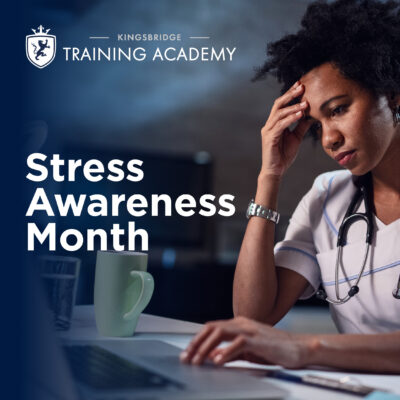In April, each year, we observe Stress Awareness Month, which aims to draw attention to the impact of stress on our physical and mental health. It also provides us with the opportunity to dedicate time to breakdown the stigma around mental health by encouraging conversation about our emotional state with friends, families, colleagues, and professionals.
Stress can be closely associated to mental illnesses, such as anxiety and depression, however it is rarely tied closely with physical health. Unfortunately, we cannot be fully healthy without the consideration of both, as a stressed mental state can lead to numerous health problems such as heart disease, insomnia, digestive issues, immune system challenges and more.
The Impact of Stress
When pressures or threats arise, stress hormones, such as adrenaline, noradrenaline and cortisol, are released in the body, and a “fight or flight” response is initiated. This causes:
- Increased blood pressure
- Increased heart rate
- Headaches
- Muscle tension
- Nausea
- Indigestion
- Dizziness
- Sleeping problems
- Sweating
- Changes in appetite
Once the pressure or threat has passed, stress hormone levels usually return to normal. However, if constantly under stress, these hormones remain in the body, and, overtime, build-up, causing damage to health through long-term illness. A study in 1998, led by Dr. Lipton at Stanford University Medical School, concluded that stress is a cause of at least 95% of all illness and disease. Related physical conditions include:
- Obesity
- Alzheimer’s disease
- Heart disease
- Irritable bowel syndrome
- Tension headaches
- Diabetes
- Depression
Ways to Manage Stress
- Exercise – Aim to work out around 2.5 hours a week to relax your body and mind, and improve your mood.
- Relax – Release the tension in your muscles through stretching, taking hot baths or showers, and getting 8+ hours sleep.
- Healthy Eating – Eat a regular, well-rounded diet to fuel your body, balance hormones, and improve mood and energy levels.
- Take Your Time – Rushing through life can cause undue stress. Accept that you are going to finish a task in your own time and stop trying to constantly move at high speed. A simple example of this is to move into the slow lane when driving.
- Make Time for Hobbies – Turning your attention to something you enjoy and partaking in an enriching activity can reset your body and mind.
- Open Up to Others – A problem shared is a problem halved. Even if does not help with your mental load, talking about your stress can open streams of support and guidance.
The Stress Management Society – Recommendations for this month
- Share your coping mechanisms – if something has worked for you why not share it. It might benefit someone you care about and in the meantime, it might help you take your focus off your own challenges.
- Be nice to those who are stressed and anxious – we are all undoubtedly going to experience stress and anxiety in our lifetime so treat others going through it with compassion and empathy.
- Talk about Stress and it’s effects – lets work together to reduce the stigma that is associated with stress by talking about the topic openly and freely with friends, family and colleagues.
- Look after yourself – we all need to think more about self–care. Take time out of your day to relax or do something that you enjoy. Don’t forget to exercise and eat well, even when you feel too stressed.
The most crucial thing you can do when you are stressed or anxious is to make sure you are continuing to look after yourself. Make time to relax when you need to and learn to say no to requests that are too much for you.
Because Life Matters.
Written by:
Geana Convery
Marketing and Development Officer

